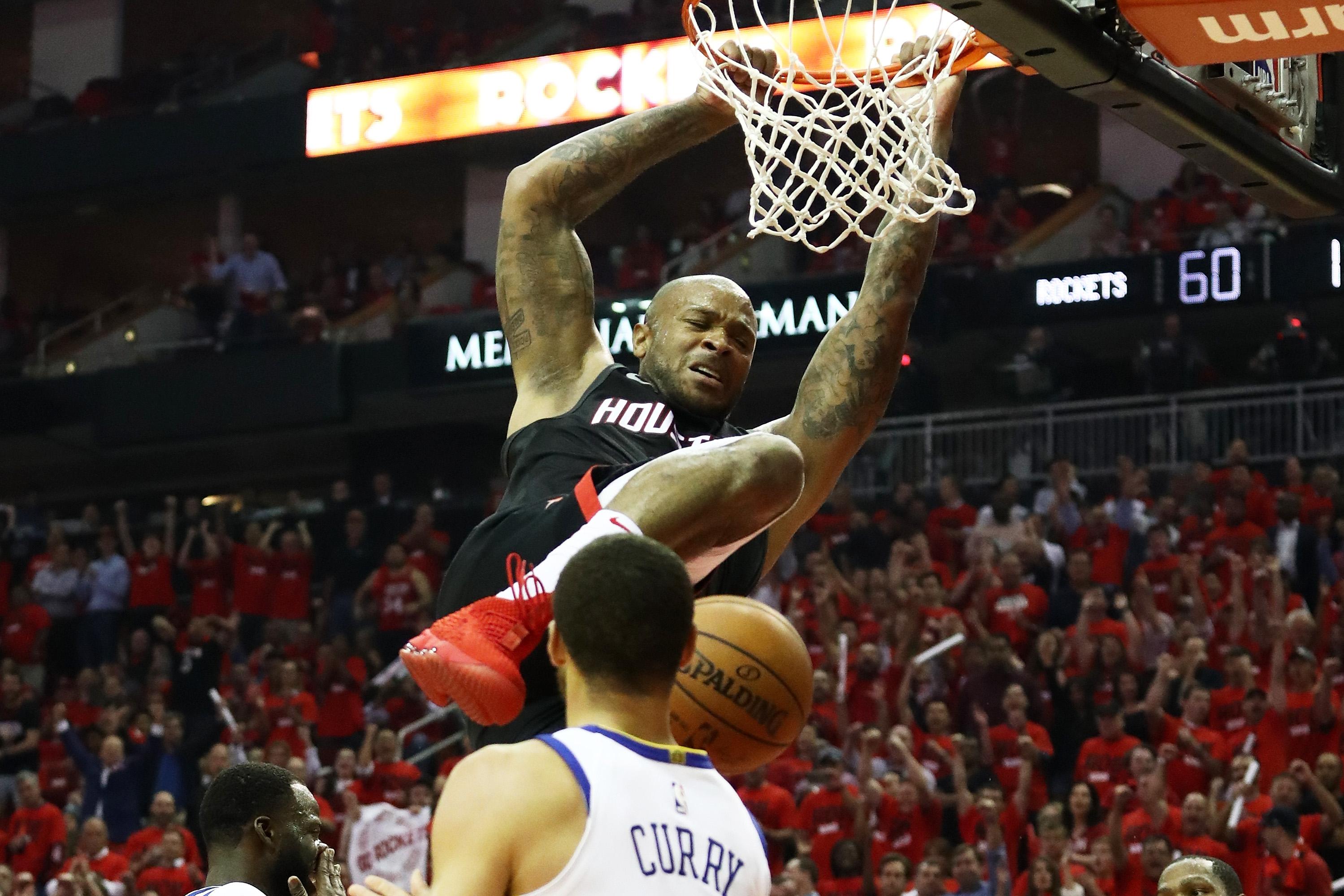
Call it the P.J. Tucker Game: The Rockets evened up the Western Conference finals with a 22-point win over the Warriors, fueled by 22 points from Tucker, a 33-year old—Uh, small forward? Power forward? Thicc forward?—who had scored at least that many points only four times in more than 500 career NBA games.
Tucker shot 8-of-9 from the field in the 127-105 victory, tying a career high by drilling five 3s. This from a guy who averaged 6.1 points this year, never scoring more than 20 in a game. If the Rockets’ win hadn’t been such a blowout, he might have stayed in long enough to surpass his career high of 24. For comparison, Steph Curry and Klay Thompson combined for 24 points on Wednesday.
He’s an unlikely star: Anthony Leon—P.J. stands for “Pops Junior”—played in Ukraine, Israel, Greece, Italy, and Germany before starting an NBA game. He was previously best known for his exceptional shoe collection and the ill-fated decision of others to term him the “LeBron stopper” ahead of last season’s Eastern Conference semifinal matchup between the Raptors and Cavaliers. (He did not stop LeBron, who averaged 36 points in a sweep.)
But Tucker isn’t trying to be a star. After last year’s LeBron Stopper debacle, Tucker preempted anybody potentially calling him a Kevin Durant stopper by laughing off questions about whether he—or anybody—could stop such an effective scorer.
Wednesday night, he was just a role player—the most effective role player any role player could be, but still, a role player. He was just extremely efficient at finishing the opportunities set up for him by the Rockets’ actual stars. The highlight here is Chris Paul performing a magic trick with a basketball in a very important NBA game; Tucker shows up for about seven frames to sell Paul’s sorcery:
Here, Paul launched a thousand memes by crossing Curry to the floor before Tucker politely dunked over nobody:
Essentially, Tucker spent all night at the two most efficient spots on the floor, camping out in the corner for a short 3 and cutting to the hoop when the opportunity arose.
All six of his 3-point attempts came from the corner, all three of his 2s were off of cuts to the hoop. This is textbook Moreyball:
What Houston needed in Game 2 was production from its role players. In Game 1, the Rockets’ stars showed up—James Harden had 41 points, Paul had 23—and they lost by double digits. Essentially everybody outside of Harden and Paul disappointed. The team’s bench had only 21 points on 26 shots; Tucker went 0-for-3 with one point. It seemed for a moment like Houston’s grand experiment that won the Rockets a league-best 65 games was for naught, as the home-court advantage they’d fought for all year was gone.
The Rockets’ offense, an ode to efficiency all season long, was butt that night. It seemed as though their goal was to slow down the game with isolation plays to get the Warriors out of rhythm, even though the Rockets’ historically effective offense was at its best when pushing the tempo and moving the ball. Three times, the Rockets got called for shot-clock violations. A Mike D’Antoni team! The guy who invented Seven Seconds or Less was coaching a team whose offense was a 24-second mess.
In Game 2, Harden played kinda poorly—he shot a dismal 3-for-15 from 3—but Houston’s ball movement was freer and players besides the Rockets’ stars got involved. Eric Gordon had 27 points, while Trevor Ariza had 19 on nine shots.
Nobody is going to iso their way to victory over the Warriors juggernaut. In Game 1, the Rockets didn’t look like they could take down Golden State—or even come reasonably close. In Game 2, they unleashed the offense that was better than Golden State’s all year long. The Rockets won’t need P.J. Tucker to have 22 points again to beat the Warriors. But they will need to keep playing basketball that leads to players like Tucker having high-percentage looks at the end of extremely Morey possessions.
